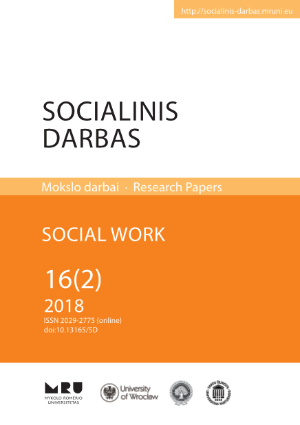MOKYMASIS VISĄ GYVENIMĄ: LIETUVOS ATVEJIS
LIFELONG LEARNING: LITHUANIA’S CASE
Author(s): Jolita DudaitėSubject(s): Social Sciences, Education, Vocational Education
Published by: Mykolas Romeris University
Keywords: lifelong learning; PIAAC; adults;
Summary/Abstract: After the publication of the EU’s Memorandum on Lifelong Learning, the relevance of lifelong learning became emphasised all over Europe including Lithuania. The Seimas of the Republic of Lithuania approved the National Progress Strategy “Lithuania 2030” where lifelong learning is mentioned as one of the key factors which will contribute to ensuring the creation of smart society in Lithuania. The National Progress Strategy states that it will be aimed at developing an effective framework of lifelong learning in Lithuania which would effectively apply information and communication technology and ensure acquisition and improvement of knowledge and skills necessary for the dynamic society. The idea of lifelong learning and conditions and possibility of implementation thereof is important and relevant to both Lithuania and wider society. This raises the question of the extent to which the adult learning in non-formal education is popular in Lithuania and what social factors are connected with such learning. The purpose of the article is to analyse the extent of the adult lifelong learning in Lithuania and the factors which condition such learning. In order to achieve the set purpose, the survey data of the Programme for the International Assessment of Adult Competencies (PIAAC), commissioned by the Organisation for Economic Co-operation and Development (OECD), were used for the analysis. The data allow estimating the participation of persons aged 16–65 in the lifelong learning activities. According to the analysis of the results, the activity of Lithuania’s population in terms of participation in lifelong learning is one of the lowest compared with other countries. Over the last year, slightly more than a quarter of Lithuania’s adult population participated in various trainings. The most common type of learning is work-related training, the least common – private lessons. Persons with pedagogical background are the most active participants in any kind of training, followed by the representatives of medicine and social welfare, social sciences, business, law, humanities, languages and arts. The factors having significant influence on lifelong learning activity are gender, education, field of education, having children or having no children, earnings. Most of those who wish to improve their knowledge and skills find the opportunity to do so. Obstacles for participation in desired training are more often faced by women than men and by persons having children than those who have no children.
Journal: Socialinis darbas
- Issue Year: 16/2018
- Issue No: 2
- Page Range: 226-239
- Page Count: 14
- Language: Lithuanian

